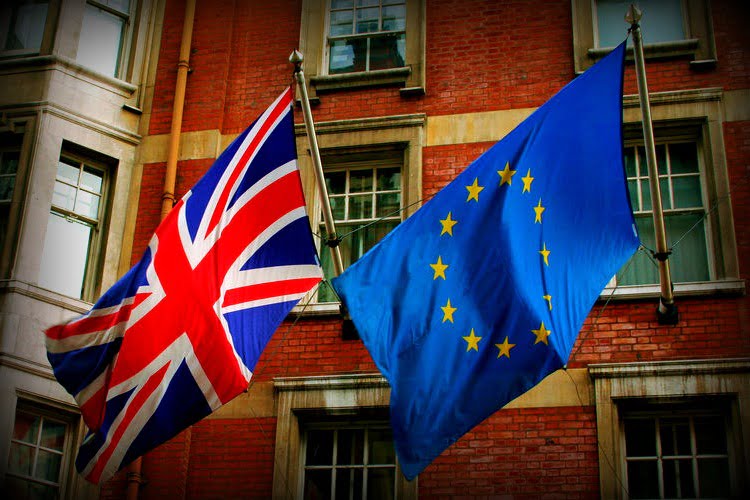After months of speculation over the possible terms of Britain’s departure from the EU, Prime Minister May announced on Tuesday that she would abandon the single market if necessary, in favour of ending the free movement of labour. Whilst appeasing her party and her voters, she has left the Establishment gravely concerned about the uncertain future ahead.
After months of vexed speculation over the possible terms of Britain’s departure from the EU, Prime Minister May mounted the podium on Tuesday to announce her grand Brexit plan to the world. In a 45-minute speech, May set out her vision for a “stronger, fairer, more united and more outward looking” Britain; a “global Britain” which will “re-discover its role as a great trading nation”.
On the crucial question of the upcoming negotiations with Brussels, May could not have been clearer: neither Hard Brexit nor Soft Brexit, but Best of Both Brexit! The government will deliver a “bold” and “comprehensive” free trade agreement with Europe, which grants the “greatest possible” access to the single market without all the unnecessary bother of free movement of labour, European law, and contributions to the EU budget. City bankers will have their transitional provisions; workers can look forward to even better protections; and all will prosper in this, the best of all possible Brexits.
The Tories rejoiced (for the most part). Boris was bullish, hailing May’s “powerful Brexit vision”. Theresa Villiers even told the BBC it had made her feel quite “emotional”. UKIP appeared pleasantly surprised, with Nigel Farage calling it “real progress”, and accusing the Prime Minister of stealing his lines. It was karaoke night in Tory-land and the only song on the jukebox was “Land of Hope and Glory”.
Beyond the Tory celebrations, however, the mood was mixed. Business leaders were cautiously sceptical, with the CBI director-general warning, “Businesses want to make a success of Brexit but will be concerned about falling back on damaging WTO rules”. But perhaps the most telling response came from EU official, Jacqueline Minor, who, with a smile and a shrug simply, said, “What we will take seriously is the invocation of Article 50.”
In reality, May’s speech said much more about the multitude of contradictions faced by her government than the likely nature of any Brexit deal. Beneath the tired cliches and repeated appeals to “unity”, all of the cracks which were so brutally exposed on 23rd June last year are still very much present, and threaten to undermine not only the government, but the United Kingdom itself.
A hard rain’s a-gonna fall
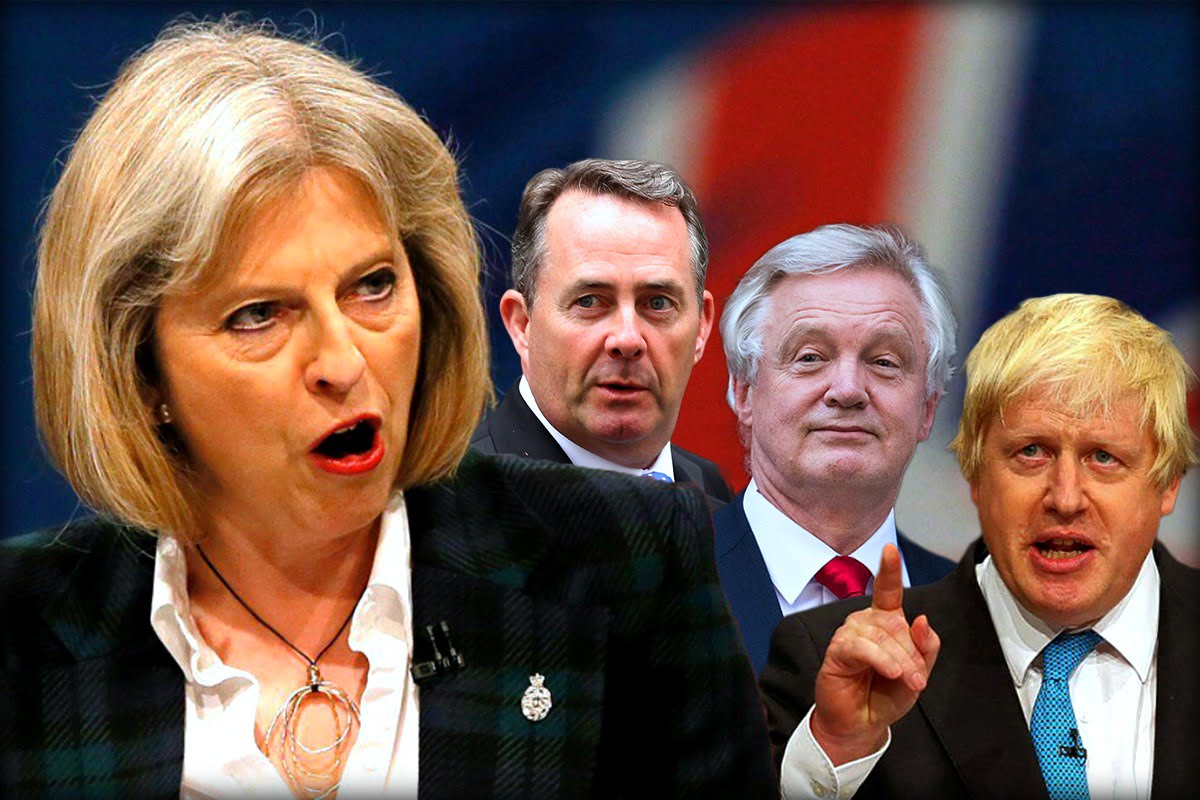 It is interesting to note that on 3rd January the UK’s ambassador to the EU, Sir Ivan Rogers, resigned with a letter which stated, “We do not yet know what the government will set as negotiating objectives for the UK’s relationship with the EU after exit”. That a senior civil servant, so used to operating behind the scenes, would come out openly against the government’s plan (or lack thereof) on such an important issue shows how deeply this crisis has penetrated into the British establishment.
It is interesting to note that on 3rd January the UK’s ambassador to the EU, Sir Ivan Rogers, resigned with a letter which stated, “We do not yet know what the government will set as negotiating objectives for the UK’s relationship with the EU after exit”. That a senior civil servant, so used to operating behind the scenes, would come out openly against the government’s plan (or lack thereof) on such an important issue shows how deeply this crisis has penetrated into the British establishment.
It is not a coincidence that May’s speech, with its 12 negotiating objectives, was delivered only two weeks after the publication of Rogers’ letter. It is an obvious attempt to save face amidst mounting criticism on all sides, but any respite which may have been earned will be temporary, if not short-lived.
The question of Britain’s access to the single market runs like a fault line through the entire debate over Brexit. Any deal which retains the freedom of movement, the overarching jurisdiction of European courts and contributions to the EU budget would, as May herself said, “mean not leaving the EU at all”. The idea that the grassroots of the Tory Party, and with them a significant chunk of the parliamentary party, not to mention millions of Leave voters, would consider this as anything less than a criminal act of betrayal is fanciful to say the least. It could quite easily bring an end to the Conservative Party as we know it. For this reason more than any other, May had to be seen to offer a “clean break” with the EU and its institutions.
But, more than the electorate, more even than her party, the Prime Minister ultimately has to answer to British business and its interests. For all May’s talk about Britain’s role as a “great trading nation”, the reality is that over the last 40 years the British economy has become increasingly dependent on financial services, centered in the City of London, a Shangri-La for so-called ‘hot money’ from all over the world.
As Mark Boleat, policy chairman for the City of London Corporation, explained in a lecture given the night before May’s speech, “If Britain does not retain access to the single market it will not be possible in law to continue doing some business that is currently done in London.” He goes on: “American investment banks do business in the EU…from businesses authorised, capitalised and managed in London. If they could not continue to do so then they would have to shift some business to the EU.”
Boleat estimated that in the best case scenario (essentially May’s strategy), the UK would see an annual decline of “£2bn in revenues, £0.5bn in tax revenue and 4,000 jobs”. In the worst case scenario, he estimated that “35,000 jobs could be at risk, along with £5bn of tax revenues a year”. He then advised, “If the UK wants to be out of the single market then a radical reappraisal of policies on tax and more particularly regulation is needed to make the UK attractive to international business.” Hardly, “Britannia rules the waves”, is it?
This is a clear warning from the British ruling class and a reminder as to what is really meant by the “national interest”. May must either accept the single market, warts and all, or she must bend over backwards to guarantee access for Britain’s financial services. It is this fact which drives May’s pursuit of an “ambitious free trade agreement” with the rest of Europe, which is by no means guaranteed.
Little Britain
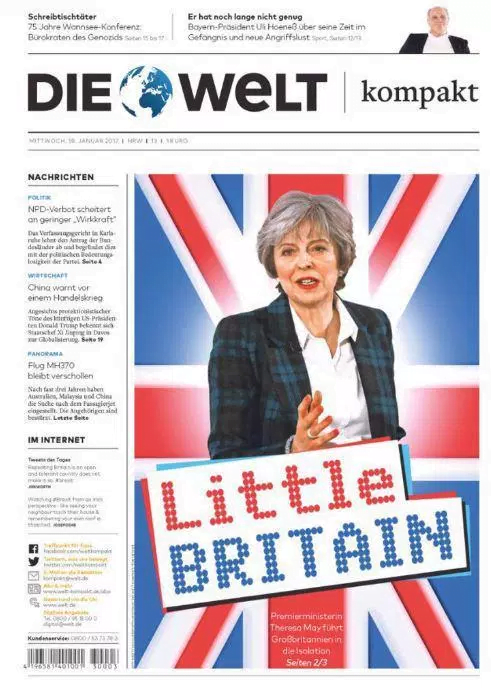 The risk of the EU bursting May’s Brexit bubble was certainly not lost on her. Brimming with warmth and affection she announced, “We are leaving the EU but not leaving Europe”. But behind the smiles and well-wishing there was a more pointed message: if the EU should seek a “punitive deal which punishes Britain and discourages other nations from taking the same path” it would be a “calamitous act of self-harm” which would jeopardise the EU’s access to the British market.
The risk of the EU bursting May’s Brexit bubble was certainly not lost on her. Brimming with warmth and affection she announced, “We are leaving the EU but not leaving Europe”. But behind the smiles and well-wishing there was a more pointed message: if the EU should seek a “punitive deal which punishes Britain and discourages other nations from taking the same path” it would be a “calamitous act of self-harm” which would jeopardise the EU’s access to the British market.
Again, the “tough” stance threw many Tories into fits of ecstasy. “Give us a fair deal or you’ll be crushed”, roared The Telegraph, while Boris made some bizarre reference to “punishment beatings” in a WW2 film. The reaction on the continent however was rather different. The German newspaper, Die Welt, published a front cover with the headline, “Little Britain” in a comically accurate appraisal of the UK government’s bargaining power. As said the lions in Aesop’s fable, “Your words, O Hares! are good; but they lack both claws and teeth such as we have.”
The EU is not a passive, monolithic bloc. It is currently undergoing its own crisis, not least in relation to Italy, where EU rules are preventing the Italian state from intervening in the country’s banking collapse. If the UK is allowed to negotiate bespoke access to the single market, then what is to stop Italians from demanding their own bespoke agreement? Or for that matter the likes of Spain or Greece, who have seen their youth unemployment rise to over 50% as a result of EU enforced austerity?
It is very unlikely that anyone in the EU would be prepared to provoke a trade war with the UK over this question. But it is even less likely that the European powers be prepared to give the UK all of the benefits of EU membership without any of the costs. Whatever the negotiating position taken by the EU, one way or another Britain will have to pay to retain access to its most important foreign market; and when it does pay, it will be the British workers who foot the bill, as ever.
All May can do is put off the evil day – and her European counterparts appear happy to assist her, for now. As the negotiations begin, however, it will become increasingly clear that May’s government will have to make humiliating concessions. It is surely with this in mind that May pleaded for unity and stressed that it is “vital we maintain our discipline”. It will only take one unguarded outburst to provoke a rebellion which could paralyse the government.
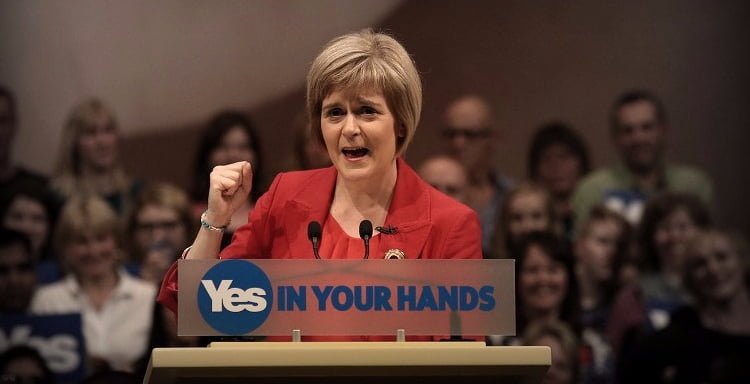
Precious Union
Almost immediately after the result of the June referendum was announced, the possibility of a second referendum on Scottish independence was raised. In Scotland, 62% of voters voted to remain in the EU, and Nicola Sturgeon had repeatedly warned that the UK’s membership of the single market was a non-negotiable point for the SNP. Sturgeon’s response to May’s speech was blunt: “The UK Government cannot be allowed to take us out of the EU and the single market, regardless of the impact on our economy, jobs, living standards and our reputation as an open, tolerant country, without Scotland having the ability to choose between that and a different future.”
If a second referendum should take place in Scotland – and this has certainly become more likely – it is not at all ruled out that Scotland could leave the UK. In fact, in the current context it would be the most probable outcome. Such an event would not only be a tremendous blow to British capitalism, it would prompt an unprecedented constitutional crisis and even a snap general election in chaotic conditions. No wonder then that May was so gushing about “the precious union at the heart of everything we do”.
When David Cameron made his fateful decision to hold a referendum on Europe, he was effectively presented with a choice between breaking his party, or the country. May is now presented with the same choice but on an even greater scale. Whichever path she chooses, the crisis in Britain will inevitably throw up further political shocks and convulsions. But what position should the Labour Party take on this issue if it is to be able to take advantage of these events?
Confusion
Jeremy Corbyn was quick to highlight the contradiction in May’s plan to leave the single market and yet maintain access to it, and has lambasted the government many times on its intention to cut tax rates, creating a “bargain basement” economy. But beyond this, there has been confusion as to what exactly the Labour Party’s position is on most questions, such as the free movement of labour.
In a policy announcement last week, Corbyn stated, “Labour is not wedded to freedom of movement for EU citizens as a point of principle, but I don’t want that to be misinterpreted, nor do we rule it out.” Meanwhile, the shadow foreign secretary, Emily Thornberry, made the comment, “We’re not going to die in a ditch about it”. Again, when asked if immigration levels were too high, Corbyn responded, “No”, but when shadow work and pensions secretary, Debbie Abrahams, was asked if Labour wanted to see immigration levels come down, she responded enthusiastically, “Yes we do”.
In the end, despite Corbyn’s policy re-launch, the overall impression was that Labour had no policy at all. Viewed in combination with the party’s insistence that Britain should remain in the single market, its position makes even less sense. As far as the EU is concerned, the single market is wedded to freedom of movement, as a point of principle, regardless of what the Labour Party think of it.
This is not a new problem. From Ed Miliband’s infamous “controls on immigration” mug, to Labour MPs campaigning with David Cameron during the referendum, Labour’s troubles over the EU have highlighted, perhaps more than anything else, two major problems, which if left unresolved may lead the party to ruin.
Opportunism
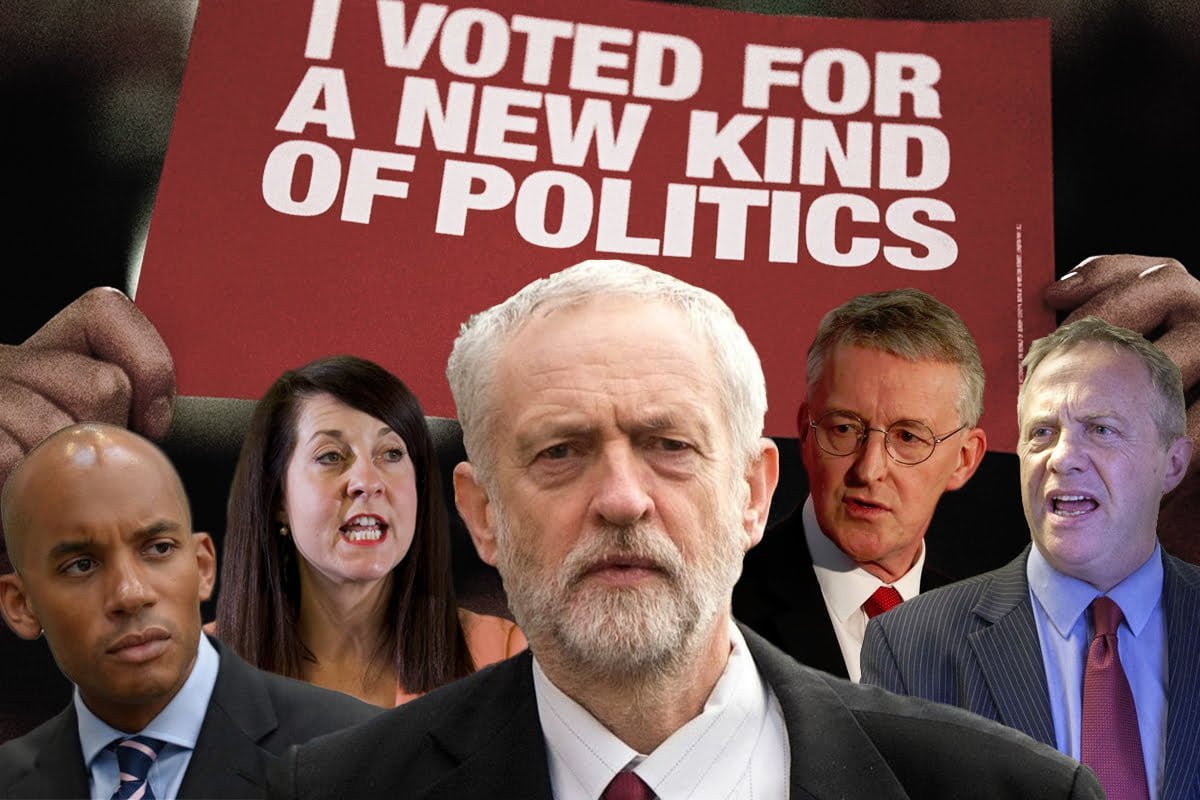 The first relates to the total incompatibility between the Corbyn leadership, backed by the vast majority of party members, and the bulk of the PLP and its underlings. Time and time again Corbyn has appeared as a hostage of his own MPs who have shown staggering opportunism at every turn.
The first relates to the total incompatibility between the Corbyn leadership, backed by the vast majority of party members, and the bulk of the PLP and its underlings. Time and time again Corbyn has appeared as a hostage of his own MPs who have shown staggering opportunism at every turn.
Corbyn has in fact always argued, correctly, that the crises in the NHS, housing, low-paid work, unemployment and education are not a product of immigration at all but rather of the Tories’ attacks on workers and the services they need. And yet, this message has been drowned out by shadow ministers and Labour backbenchers who are falling over themselves trying to show they understand “concerns” that they have ignored for decades.
Even before Corbyn was first elected, it was the right wing of the party which took the initiative on the EU referendum and presented as a fait accompli, not only the party’s support for Remain, but effectively a shared platform with the Tories on an almost identical programme. Now, the same MPs who viciously attacked Corbyn in public for not being sufficiently pro-EU are among the most vocal (and hypocritical) advocates for immigration controls.
These careerists are totally incapable of standing up to the Right, and instead capitulate to it at a moment’s notice. May follows her reactionary base; the Blairites follow May; and the so-called soft-lefts follow them – in what might be the worst conga line imaginable. Corbyn has nothing to gain from joining in this ridiculous spectacle, and everything to lose. The first step to a credible opposition is to have candidates who actually oppose the Tories. With right-wing MPs choosing to abandon their constituencies, there has never been a clearer case for mandatory reselection. If Corbyn is not capable of making this case then he, and we, will suffer for it.
For a socialist policy
But this is only part of the problem, a unified Labour Party must pose an independent alternative not only to the Tories but also to the hypocrisy of both sides in this debate. But if it is to do this, it must break decisively with capitalism. There is no other way out of this crisis. Corbyn’s confused policy ultimately reflects a much wider problem: that of the limits of reformism in general.
Any party which makes it its aim to manage capitalism must accept its laws, its contradictions and its crises. In a period of boom this may deliver partial reforms, but in a time of crisis and austerity it can only lead to a pale imitation of the ‘real’ capitalist parties, as we have seen.
To stake Labour’s fortunes on the UK’s membership of the single market in order to “protect jobs” whilst also offering vague compromises on immigration offers workers nothing – only the continuation of the same crisis which delivered Brexit in the first place. This policy essentially amounts to the argument that the interests of the City of London and those of British workers and youth are ultimately the same as long as all act fairly. They are not. The growing dominance of the bankers goes hand in hand with the increasing inequality, exploitation and poverty in Britain.
The interests of the exploited masses of Britain and the world lies precisely in the expropriation of these parasites and the use of the wealth produced by society for the benefit of society as a whole, and not a handful of millionaires. Only then can we guarantee jobs for all.
This must be the starting point for any socialist position on Brexit, the single market and freedom of movement. Advising the capitalists on their best interests is a pointless endeavour; they are already well aware and more than capable of protecting them. What the workers and youth of Britain need is a party which stands up for them against their exploiters, not one that binds them together. The Labour Party was founded on that promise. Only a bold socialist programme can keep it.

